Streets of New Capenna Mechanics
Five families. Five opportunities to make it in this town. The right connections—and knowing the rules—are everything in Streets of New Capenna.
Loyalty to one is war with four, so choose carefully. Maybe you need to know a little more before you decide? Smart kid. Each family has its methods. If someone's lucky, they go their whole life in peace and never see those methods. You? You get to see them all in one go. What a day.
Connive
The Obscura are the white-blue-black family, and their signature mechanic is connive. The Obscura use magic to manipulate and distract, always looking for a more advantageous position. Connive can put you in a more advantageous position, both in terms of creature strength and hand quality.
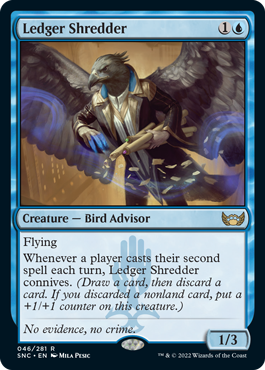
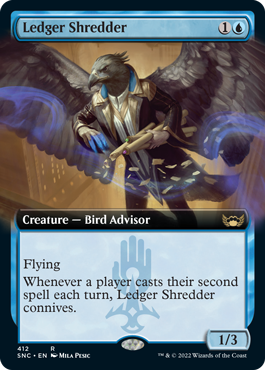
If a creature you control is instructed to connive, here's what you do: First, draw a card and discard a card. This might help you find the land you need, or later in the game might let you trade away an unneeded land while getting to your game-ending threats a little quicker. But not so fast. If you discard a nonland card, you put a +1/+1 counter on the creature that connived.
A creature can connive even if it's not still on the battlefield. So, if Ledger Shredder meets an unfortunate demise in response to its own triggered ability, you'll still get to draw and discard. No +1/+1 counter of course, but creatures that want to grow stronger should try to not get dead.
Casualty
The Maestros are the blue-black-red family, and their signature mechanic is casualty. The members of this elite society appreciate no finer art than the art of the kill. Casualty is an optional additional cost that appears on spells like A Little Chat.
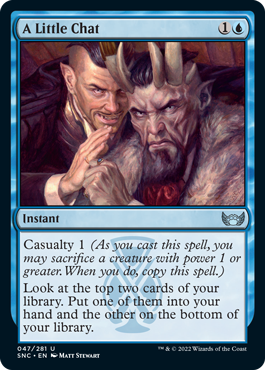
As an additional cost to cast a spell with casualty, you may sacrifice an underling
Bloodthirsty though you may be, you may sacrifice only one creature to any one casualty ability. If a spell has casualty 2, for example, you can't sacrifice two 1/1 creatures, although I appreciate your spirit.
Blitz
The Riveteers are the black-red-green family, and their signature mechanic is blitz. Industrious and tough as nails, the Riveteers never shy away from a fight, and blitz gets you into the action without delay.
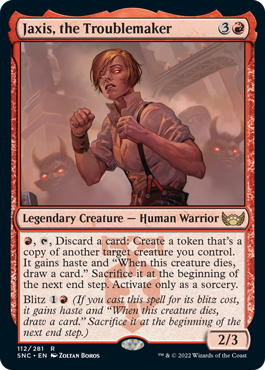
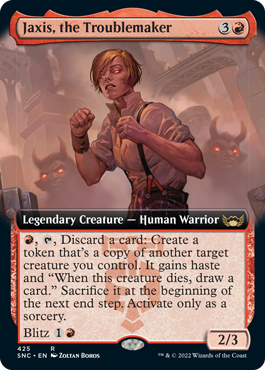
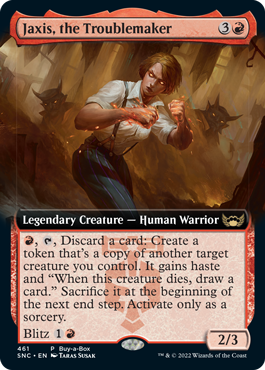
Blitz is an alternative cost that appears on several Riveteer creature cards. As you cast a spell like Jaxis, the Troublemaker, you can cast it normally for its mana cost, or you can choose to cast it for its blitz cost. Either way, its mana value doesn't change. For Jaxis, it's always 4.
Casting a spell for its blitz cost has several effects. The creature gains haste and "When this creature dies, draw a card." You won't have to wait too long for that card, because at the beginning of the next end step, you sacrifice the creature. Hit fast, hit hard, and get out before anyone knows you were there.
The triggered ability that has you draw a card will trigger no matter how or when the creature dies. If it doesn't survive combat, you'll get the card in time to cast it in your postcombat main phase. The creature doesn't have to make it all the way to the end step and be sacrificed, though it does have to die. If it gets bounced or exiled, you won't draw a card.
Alliance
The Cabaretti are the red-green-white family, and their signature mechanic is alliance. Stylish and hedonistic, the Cabaretti are all about their connections. Alliance is an ability word that highlights triggered abilities that trigger whenever another creature enters the battlefield under your control.
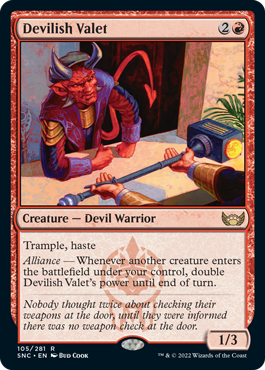
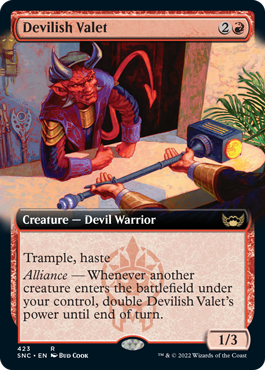
Nothing complicated here—you want more creatures and plenty of them. If you control multiple creatures that each have an alliance ability and a creature enters the battlefield under your control, all of the alliance abilities trigger. Those abilities can be put on the stack in any order, and the last one to be put on the stack will be the first one to resolve.
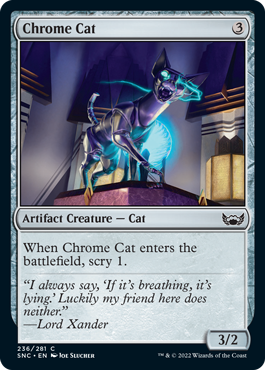
If the entering creature itself has an enters-the-battlefield triggered ability, like Chrome Cat does, that ability gets thrown in the mix with all the alliance abilities. And don't forget tokens! They enter the battlefield just like nontoken creatures do, and they're great for enabling alliance abilities.
Shield Counters
The Brokers are the green-white-blue family, and their signature mechanic is shield counters. So, you think you're untouchable? Shield counters make your creatures (and occasionally, other types of permanents) harder for your opponents to remove.
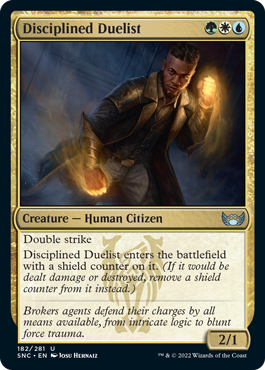
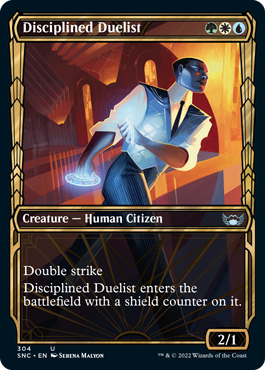
Shield counters provide two benefits. First, if a permanent with a shield counter on it would be destroyed by an effect, a shield counter is removed from the permanent instead of the creature being destroyed.
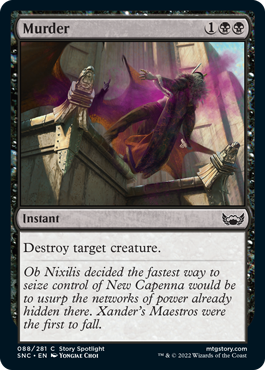
If your opponent has Murder on their mind, they're going to need backup plans, because the only thing your creature will feel is the shield counter being removed and the sweet, sweet taste of retribution.
The second benefit works against damage. If a permanent with a shield counter on it would be dealt damage, that damage is prevented and a shield counter is removed from the permanent. In this case, "permanent" means creature or planeswalker, the two card types that can be dealt damage.
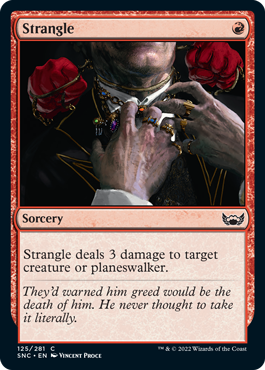
This prevention effect works to stop any form of damage—combat damage, damage dealt by spells like Strangle, or damage dealt because of activated or triggered abilities. But be careful. It won't work if the damage is unpreventable. A shield counter will be removed and the creature or planeswalker will be dealt damage.
Each instance of damage (and, for that matter, each destroy effect) removes only a single shield counter, so if you can find a way to give your creatures multiples, your opponents may soon find themselves with lots of problems and no easy answers.
Hideaway
There's one returning mechanic to touch on: hideaway. Hideaway isn't associated with any specific family and appears on a cycle of cards, as well as on a few reprints in the Commander decks. Hideaway lets you store a card away for future use.
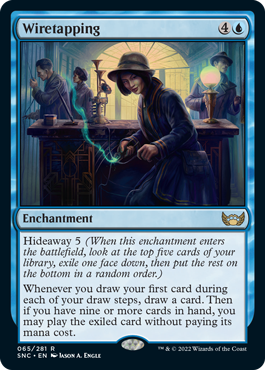
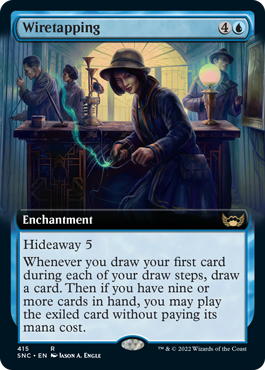
Hideaway has received a small update since it last appeared. Hideaway is an enters-the-battlefield triggered ability. When a creature with hideaway N enters the battlefield, look at the top N cards of your library, exile one of them face down, then put the rest on the bottom of your library.
Hideaway used to inherently mean four cards, but now it can be any number (especially five!), and that number will appear after the word "hideaway." Also, hideaway used to inherently mean the permanent with hideaway entered the battlefield tapped, but this is no longer true. Previous cards with hideaway now have "[This permanent] enters the battlefield tapped" as a separate ability.
Permanents with hideaway will have another ability that lets you play the exiled card without paying its mana cost under certain conditions.
Family Feu . . . No, You Know What, Like Five Other Authors Are Going to Use That One. I Refuse.
New Capenna holds great opportunity, but no one here does it alone. Good luck out there. Find your foothold. Find your fortune. Find your family.

